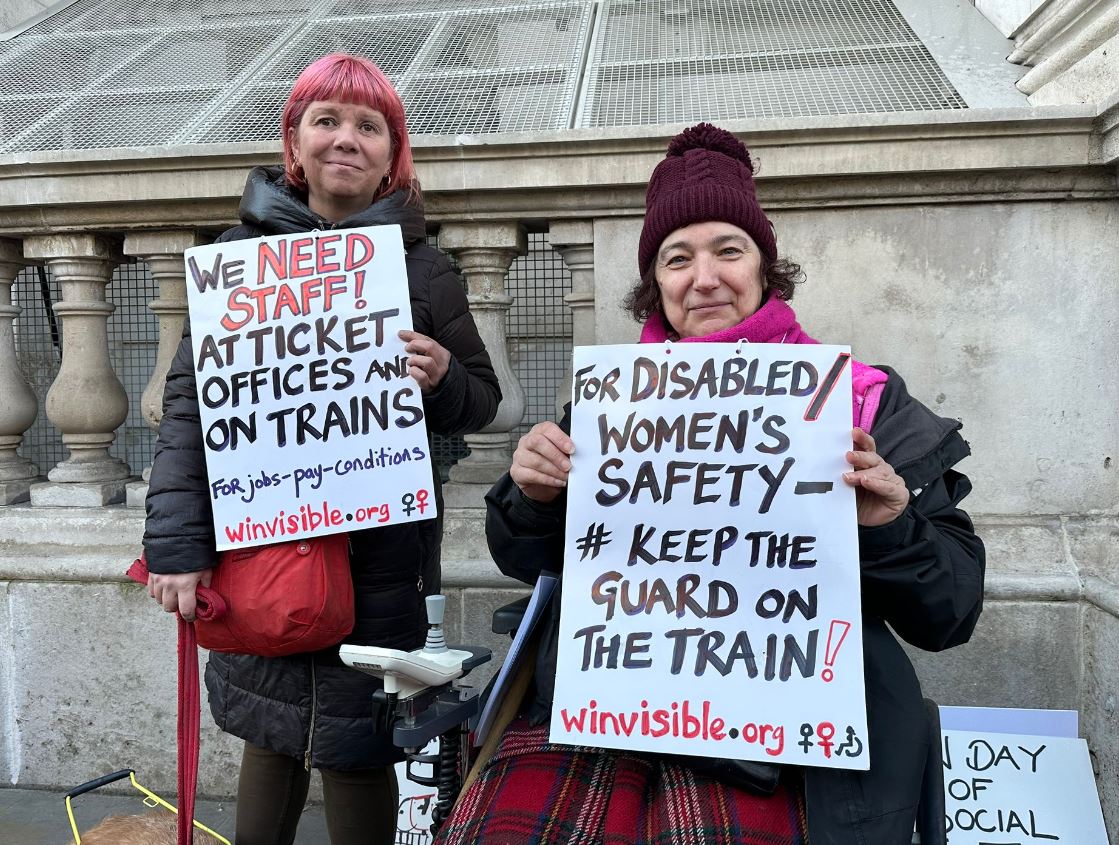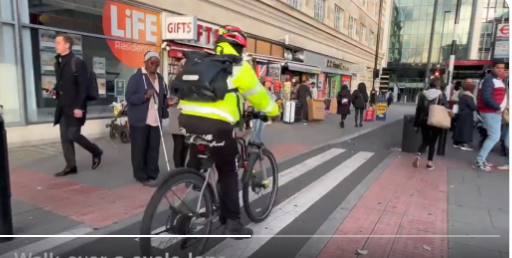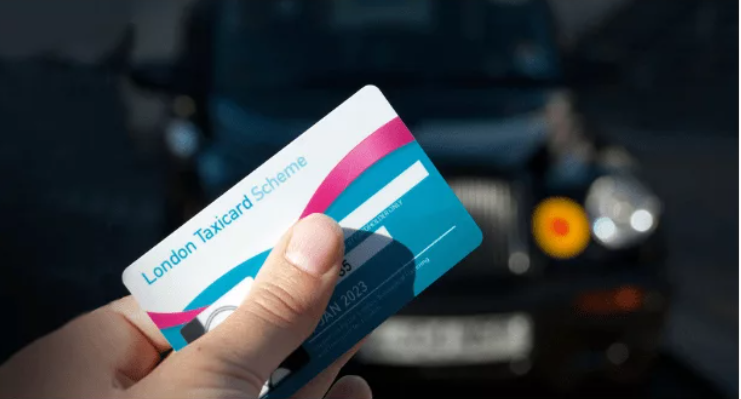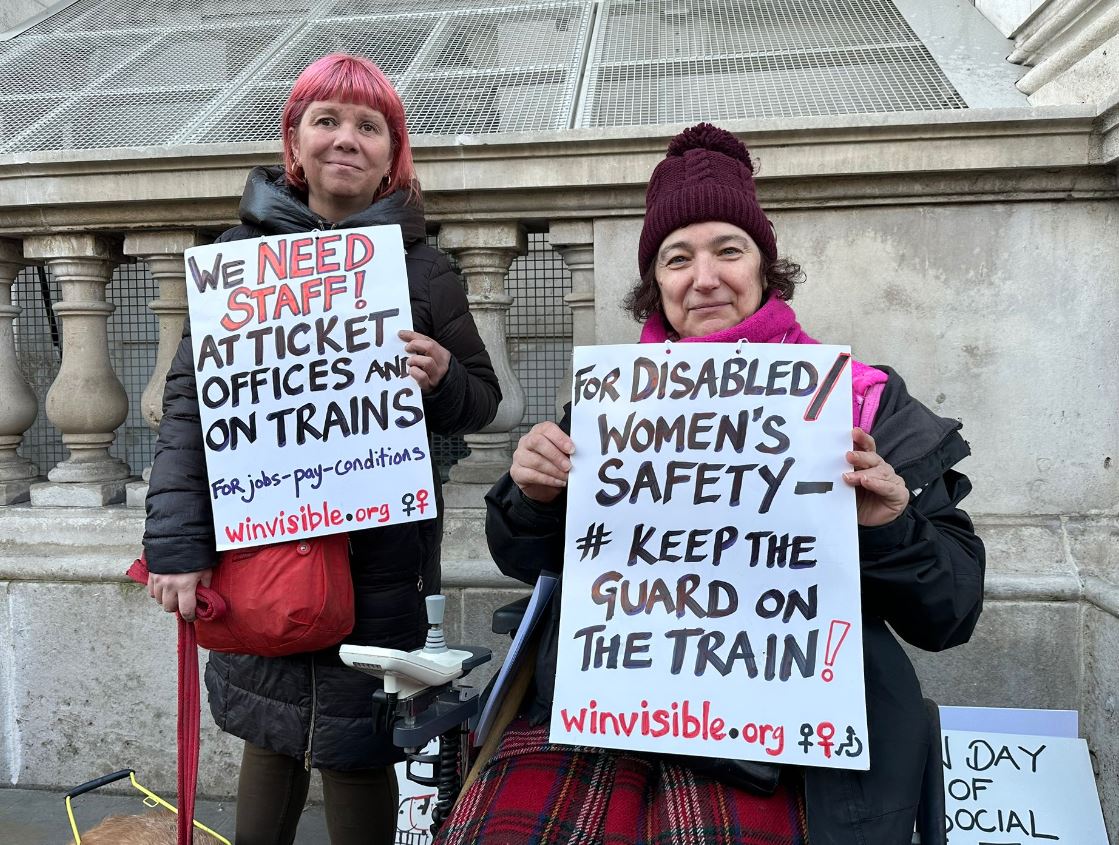
Here is our submission to the Transport Committee inquiry Accessible transport: legal obligations. The inquiry was launched after campaigners complained about transport access getting worse and equality law being ignored. The Committee examines transport policy issues and has MPs from various parties. Our submission was published on 1 June.
Inquiry questions
- How effective is the current legislation aimed at ensuring accessible transport for all?
- How can existing legislation be better enforced to make accessible transport a reality?
- Are operators and local licensing authorities fulfilling their legal obligations to disabled travellers and travellers with other accessibility needs? If not, why not?
- How well do complaints and compensation processes work when things go wrong?
- Are there specific transport modes or kinds of journeys where compliance with legal obligations is especially patchy? Are there differences according to where in the country you are travelling? What difficulties does this cause for travellers with access needs?
- How effective are the relevant regulators at enforcing accessibility in transport? These include the Equality and Human Rights Commission, the Office of Rail and Road, Local Licensing Authorities [and the Civil Aviation Authority].
- Do current legal obligations or guidance need to be strengthened?
- What best practices should transport operators be following to improve their performance on access and inclusion for users?
- How effective is the Government’s Inclusive Transport Strategy, and how well does it influence decision-making across transport policy? How could it be improved?
Our statement:
Who we are
WinVisible is a grassroots multi-racial organisation enabling disabled women to have a voice. We provide self-help information and support, campaigning and other activities. We have a London- and UK-wide network. We bring together asylum-seeking, refugee, UK-born and immigrant women, with visible and invisible disabilities; older and younger, disabled mothers / family carers, lbtqi+ and more. We campaign for our rights from disabled women’s viewpoint, for benefit and healthcare rights for all regardless of immigration status, for women’s safety and against discrimination of all kinds — including cuts to benefits and services, care charges. (Addition: In 2008, we successfully challenged the refusal of Freedom Passes to disabled asylum seekers by the London borough of Lambeth. There is no immigration status test for the Freedom Pass, you have to be resident in the borough — the council wrongly told them that they had to have won their right to stay in the UK.) In an inaccessible and prejudiced world, coping with disability and ill-health is hard work for which we deserve an income, and our workload should be reduced via accessibility, support services, and so on. We support the international call for a Care Income — a guaranteed income for all who do the work of caring for people, the soil & the natural world.
Transport: in the 1990s we took part in the direct action and other campaigning which won accessible buses and the Disability Discrimination Act 1995. This features in documentaries and the BBC drama, “Then Barbara met Alan”. We are users of public transport, door-to-door schemes and cars/wheelchair accessible vehicles.
Overall comments on the inquiry questions
Transport is key to us living full lives and living independently.
- Inaccessibility and understaffing of transport is a huge problem. Many of us can’t go where we want, when we want to or need to. We spend a lot of time worrying about journeys beforehand and arranging them. We have to allow extra time for the journeys themselves, and they are stressful. It is clear that the current legislation is not effective, neither is it being enforced by regulators.
- Visually impaired passengers are among those of us most at risk of injury and death. The tragic death of Cleveland Gervais at Eden Park station could have been prevented if there was tactile paving on the platform, a warning over the tannoy that there was no such paving, and staff nearby. It is shocking that many stations don’t have tactile paving. The timeline for installing tactile paving is too slow. Many stations are unstaffed outside of rush hours, so visually impaired passengers can’t use them at all.
- Staff are trained to look for passengers who may need help, to prevent accidents and to spot where children or adults getting off trains have actually fallen down between the train and the platform, for example, if a child is following behind their parents, or if a passenger is drunk and misses their step. The vigilance of staff saves many lives and untold trauma for relatives. They save lives when they intervene to stop desperate people in mental distress considering committing suicide. Cutting staff and imposing multiple roles whereby staff on duty are overworked, distracted and tired from long shifts, will result in more preventable deaths and injuries. Tragically, “non-workforce” fatalities are rising again after dropping in recent years.
- Disabled passengers, including those of us with diabetes who may need first aid, with anxiety, incontinence conditions, older people whose mobility is limited; mothers and other carers travelling with children; people whose first language is not English, tourists and other visitors may all require assistance to travel comfortably. Without assistance to travel, many of us stay at home or limit our journeys.
- With privatisation of most forms of transport, company profits have become the priority, not service to passengers or decent pay and conditions for staff to enable them to provide good quality support to disabled and other passengers. Transport companies provide minimal “reasonable adjustments” under the Equality Act. The government also disregards “reasonable adjustments” and the Public Sector Equality Duty whereby they must consider the impact of their policies on groups covered by the Equality Act. One such policy is cutting train staff: closure of ticket offices in train stations, having “roaming” staff with multiple roles, and the continuing threat of abolishing train guards and having more driver-only trains than now. We are opposing these staff cuts together with the National Federation of the Blind UK with a petition presented to Prime Minister Rishi Sunak; RMT union, the Association of British Commuters and others. We need more dedicated staff, not fewer overworked with multiple roles.
- Women’s safety. Women are the majority of disabled people, mostly low-income reliant on public transport. Many of us are survivors of rape, domestic abuse and other hate crime. Women’s safety in transport, assured by staff, including the presence of women staff, is a priority for us. Disabled women are twice as likely to suffer sexual assault and to report rape as non-disabled women. While travelling we are targeted for sexual abuse and assault, for abuse as women of colour, being lgbtqi+ and other reasons. When we are travelling unaccompanied, assault also happens under the guise of “help”, for example, a man groping our breast when taking our arm, or grabbing the handles of our wheelchair and pushing us somewhere, assumed by the public to be “the carer” as they don’t know we were travelling alone. Visually impaired women who can’t see the abuser’s face, are significantly at risk as the abuser feels emboldened that they won’t be identified, despite CCTV in most places. Where staff are nearby to assist disabled passengers, disabled women are not reliant on help from other passengers and are not at the mercy of opportunistic abusers. See: https://www.theguardian.com/world/2021/nov/25/the-everyday-assault-of-disabled-women-its-inappropriate-sexual-touching-at-least-once-a-month
Our experiences Almost everyone in our group and network describes numerous bad experiences with inaccessible and unreliable transport. One member said: “Public transport for disabled people … is not safe at all, and for women as well it is not safe at all.”
Another woman said: “When we compare to [years ago], there have been some improvements but when we know that the Equality Act [and before that, the Disability Discrimination Act 1995] has been in place to bridge those severe inequalities, I don’t think the government has done a lot in terms of access for disabled people. I feel the disabled people are the most left out of society in terms of services, service provision, because everything is delayed and you find that many things are not in place and it has to be adversarial in order to win a case and I don’t think as a disabled person you should have to be constantly combatting to have access to something that should be straightforward as your right, your entitlement as a vulnerable person.”
WinVisible women also described not being informed about transport schemes we are entitled to join when we get disability benefits, so missing out.
Air quality
Some of us have asthma. Some of us use portable breathing support machines. Better air quality is urgent for children and adults, however the government and councils have allowed HS2 and other unnecessary projects which have destroyed trees and increased air pollution from construction and lorries in London and elsewhere.

Breathing in fumes in the street on the way to a bus stop or station, makes us feel ill. However, many disabled people have no choice but to use polluting cars, as other forms of transport are not accessible or manageable.
Some disabled people and family carers have no choice but to use diesel vehicles as we need vehicles which can load a heavy powerchair, and for financial and other reasons are unable to convert to electric vehicles which require a home charging point or guaranteed street charging. Only after campaigns by disabled people and organisations did Transport for London widen exemptions from the ULEZ £12.50 a day charge, for other disabled drivers and passengers who do not have vehicle tax exemption.
WinVisible was among groups who encouraged the Greater London Authority to develop their scrappage scheme for diesel vehicles, to assist disabled drivers and passengers to convert.
Public transport: some of us can’t use the tube or some trains as the air quality inside is poor and we have respiratory or other conditions like Sickle Cell where we need a higher level of oxygen in the air. Some of us can’t use public transport due to immune conditions including cancer treatment.
Pavement

“Shared use”. It is urgent to work out how disabled people and cyclists/e-scooter riders can all be safe, without being put in direct conflict. We raised this about pavement and road layout changes by LB Camden/Transport for London, in September 2020, a month before the tragic death of cyclist Celia Ward, followed by the manslaughter conviction of Auriol Grey who is partially sighted and has cerebral palsy, who has now been given a three-year prison sentence. It’s unclear whether that footway in Huntingdon was officially a shared use path. The cyclists’ organisation Camcycle is also calling for segregation or separate use. Because of deadly air pollution and the climate crisis, we support people changing to non-polluting and electric transport, but this must be safe for all.
The way cycle lanes have been put in (sometimes in the middle of a pavement with bus stop, sometimes combined with a line of car parking where disabled drivers have to cross the cycle lane to get to the pavement), often creates problems for disabled people, especially visually impaired people.
Installing cycle lanes has wiped out many road crossing points for people with mobility disabilities, dropped kerbs and places where drivers could pull in to drop off disabled passengers or where disabled drivers could park. We are forced to walk further than is manageable or abandon going to a shop for something we need, because there is nowhere to park.
Using the pavement is part of the journey to get to the bus or train. Pavement is often uneven and badly maintained, causing falls and injuries. At the same time, mature trees must be preserved and carefully trimmed, not brutally cut down, as in the Sheffield “chainsaw massacre”.
Bikes left on the pavement are an obstacle for wheelchair users and dangerous for visually impaired people. We support the NFB UK demand for lockable docking stations for bikes that are finished with.
Councils often install posts on pavements making them too narrow for a large wheelchair to get through.
Bins left on pavement. Binmen and women should be allowed time to put back bins so they aren’t left out blocking the pavement and pathways of our homes, or another team follow behind to do this. This inaccessibility is created by companies maximising their profits and councils accepting it.
Café tables should not take the whole pavement.
Buses
Why have buses been designed with only one wheelchair user space? The needs of wheelchair users and mothers/carers with buggies should not be put in conflict with each other. In Barcelona, the buses have two wheelchair user spaces, so two wheelchair users can travel together. Here, only one wheelchair space on a bus makes journeys longer, as it may be taken and you have to wait for the next bus. The bus design makes it difficult to manoeuvre into the wheelchair space. Some people need to face forward not to feel car-sick, but sometimes the bus driver will refuse to go if you do that. Complying makes the journey very unpleasant. Also facing backwards, you can’t see what’s ahead to recognise where to get off.
WinVisible women also report: Bus drivers not stopping for wheelchair users. Ramps not working. The ramp is too steep to be safe to use. Lack of power sockets for breathing equipment. Problems alerting the driver that you are there (no bus conductor/driver-only buses). Difficult to park wheelchair and to get off bus. Being refused if you have a large powerchair. Bus drivers are under pressure to meet timetable/punctuality targets and this conflicts with taking the time to help disabled passengers.
Bins and posts placed around bus stops obstruct the ramp/wheelchair user coming out, and the driver sometimes has to shunt along to find space. Sometimes the driver has to park and get out to assist when the ramp is stuck.
Rail & underground
We need staff at ticket offices, as our main contact when we arrive and to ensure that we are getting assistance from other staff, that we have the correct travel information and travel concessions which we are entitled to, and we are not overpaying, given the extra costs and disability expenses we already have. For example, Freedom Pass + Railcard concession is not available online. Help to find the accessible toilet is important and should not be restricted to Radar key, which only some people have. Being unable to find the accessible toilet ruins a journey.
We need staff in the station, including women staff, to help us travel safely, for women’s safety and against other harassment and hate crime which we are subjected to. We need assistance getting to the right platform and getting safely on the train, especially when the carriage is quite full, with others trying to get on. Blind people and wheelchair users need assistance to deal with the gap between the platform and the train. Even in “level access” stations, we need to reverse into the carriage as otherwise small front wheels drop into the gap, and need staff to direct us back and get passengers to give way. On “humped” platforms (example: St Pancras) there is still a gap, the small front wheels of powerchairs get stuck under the metal plate of the train step and we need to reverse on. If there are platform changes we may need help to get from one place to another.
Several disabled people may need help at the same time so more staff are needed for disability assistance. Assistance staff in stations have to rush between platforms to assist disabled passengers. Some of us are mothers with children, so helping us, ensures our children can travel safely too. It is essential for physical safety to have enough staff. Staff are trained to look for passengers who may need help, to prevent accidents and to spot where children or adults getting off trains have actually fallen down between the train and the platform. Their vigilance saves many lives and untold trauma for relatives. They save lives when they intervene to stop desperate people in mental distress considering committing suicide on the tracks.
On the train. We need guards on the train for disabled / women’s safety, to look out for disabled and older people who may need help. Against sexual, racist and other discriminatory harassment, in case someone is taken ill, and in case of emergency, such as a train crash where the driver is killed or injured. Petition.
Disabled people, including blind passengers, should not have to be reliant on the goodwill of other passengers in a difficult situation, as we have experienced when the train broke down and all passengers had to transfer to coaches. Read our interview in the Camden New Journal: https://www.camdennewjournal.co.uk/article/rail-station-staff-cuts-will-hit-disabled-passengers
Our group added:
Many train stations not wheelchair accessible. Longer journeys because of this. No ramps at stations. No step free access on some of underground. No staff to help get ramp. Gaps and steps at underground, not enough staff to assist. Lack of Changing Places toilets with hoists and shower chairs. Large gaps between the train and the platform (both width and height — overground trains and some platforms). Poor ventilation, bad for asthma sufferers. Lack of functioning accessible toilets on train.
Taxis & Taxicard

Taxicard is among the most unreliable form of transport in that users’ journeys are never guaranteed (as the taxi drivers are self-employed and under no obligation to accept a disabled passenger at any time). However far in advance you book, the job is only put out at the time and may have no takers. For this reason, many people can’t and don’t use it.
Eligibility for the Taxicard scheme is tied to getting PIP mobility component, so Taxicard users have been hit by the DWP delays taking a year or more to process PIP reassessments. Together with a disabled single mother who was suffering physically and financially due to refusal of Taxicard, we successfully pressed London Councils to change their policy and put a notice on their website.
Campaigning together for this win, women raised a wide range of experiences of disability discrimination/racism/homophobia and driver aggression towards women, and the main changes we want, including importantly for women’s safety and mothers travelling with our children. Hailing a cab in the street, disabled women passengers are judged on our appearance. See: https://winvisible.org/2022/11/04/disabled-women-win-taxicard-change-for-users-hit-by-dwp-delays-on-pip/
Following our campaign, Transport for London has launched its Improving safety for taxi and Private Hire Vehicles passengers review and survey:
“We are reviewing taxi (black cab) and private hire (including minicab) licensing in London to improve passenger safety. We are proposing 19 changes to improve safety and safeguarding for all passengers, especially children and vulnerable adults.”
Transport for All (representing disabled passengers) and Inclusion London are gathering the experiences of Taxicard users.
WinVisible women added: “I’ve got Taxicard but I never use it. They’re just hopeless.”
“When booking with Taxicard they say it’s within a two-hour window, there is no guarantee that if you book a taxi with Taxicard on the way there, that that one will pick you up on the way back. Taxicard can be a back-up but not a primary way to get in and out of your home. It’s unreliable.”
Taxis don’t turn up on time when we need to get to an appointment. Often can’t get a taxi on the street that will accept Taxicard, as only ComCab has the contract.
“Taxis’ head height too low. Uncomfortable ride within vehicle as thrown around. Taxi drivers don’t always pick up wheelchairs users, can get stranded. Same issue with Dial-a-Ride.”
Driving in London
The Blue Badge is not recognised in central London. This is discriminatory. The partial concessions for disabled parking are not adequate. In central London, there are a few disabled bays where free parking is allowed, otherwise you are allowed one free hour in pay parking if you make a payment. This does not make up for lack of yellow line parking. Disabled bays are often occupied by construction instead of being kept open.
Parking by app is not accessible as once parked, you often can’t see the notice on a pole which has the bay number which you need to enter, without getting out of the car and looking. Manual dexterity is needed to book parking and you have to have all information and numbers ready for the booking to go through: car details, location bay number, credit card details and number of minutes to park minus one hour.
Each borough sets its own Blue Badge parking rules, which vary. Either you have to remember which borough has which rules, or you have to check each time before a journey, which is a hassle. You can’t predict exactly where you will be able to park, and may unintentionally cross a borough boundary where different rules apply, by driving one street further down to find parking.
Aeroplanes
Please take note of the Rights on Flights campaign demands.
WinVisible women add: Planes need to provide access where you can stay in your wheelchair. No Changing Places toilets on planes. Access equipment being damaged on plane journeys. Seating and transfers to seats uncomfortable on planes. Assistance staff are often rushed and may be pressured to cut corners on safety, such as whether you are strapped in a vehicle correctly.
Ferries
Ferries lack wheelchair accessible cabins and Changing Places facilities. Lack of bays for wheelchair access vehicles with higher roofs to park on the ferry.

